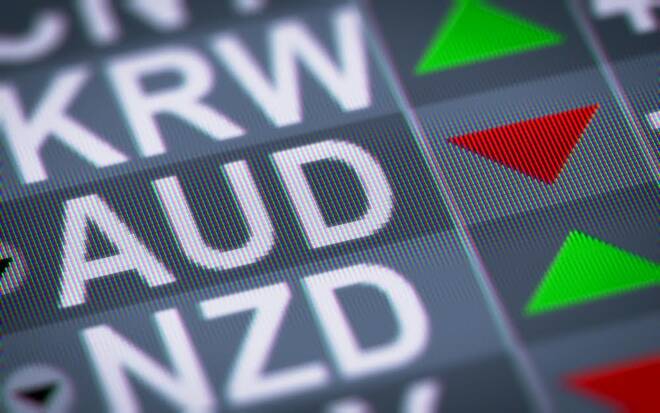Advertisement
Advertisement
RBA’s Lowe Calls for Patience as Commodity Prices Surge
By:
The early price action suggests investors are taking the news in stride as the main focus remains on the strength of commodities prices.
The Australian Dollar is trading higher early Wednesday, encouraged by a slight increase in demand for riskier assets. The Aussie is being supported despite somewhat dovish comments from a Reserve Bank of Australia (RBA) official and a report showing a weak economic outlook.
At 09:20 GMT, the AUD/USD is trading .7315, up 0.0043 or +0.59%. The Invesco CurrencyShares Australian Dollar Trust ETF (FXA) settled at $72.12, down $0.48 or -0.66%.
Australia Central Bank Sees Risks from Ukraine, Still Patient on Rates
Australian’s central bank head warned on Wednesday that the war in Ukraine was a new inflationary shock to the world economy but Australia still had time to assess the impact before likely raising interest rates later in the year, Reuters reported.
In a speech on the economy, Reserve Bank of Australia (RBA) Governor Philip Lowe said the conflict was a major downside risk to the global economy, with the major impact coming through higher commodity prices and inflation.
The RBA would be watching to see if that in turn fed through to rising wage claims, although evidence so far suggested Australians were still getting pay rises under 3%.
He noted underlying inflation in Australia had been running at 2.6% in the December quarter. This was well below levels seen in the United States and Britain, and well within the RBA’s target band of 2-3%.
Despite calls for a possible spike in inflation, Lowe argued for patience.
“The recent lift in inflation has brought us closer to the point where inflation is sustainably in the target range. But we are not yet at that point,” he said.
“We can be patient in a way that countries with substantially higher rates of inflation cannot,” he added. “Given the outlook, though, it is plausible that the cash rate will be increased later this year.”
Lowe also said there could be a risk in waiting too long on rates should inflation expectations become unanchored, but there were also risks in going too early.
Australian Consumers Turn Glum on Inflation, Floods
A measure of Australian consumer sentiment fell for a fourth straight month in March as rising inflation, the impact of floods and the conflict in Ukraine all darkened the economic outlook, according to Reuters.
The Westpac-Melbourne Institute index of consumer sentiment released on Wednesday slid 4.2% from February, when it fell 1.3%. The index was down 13.6% from March last year at 96.6, and the lowest since September 2020.
Daily Forecast
Wednesday’s price action suggests investors are taking the potentially negative news in stride as the main focus remains on the strength of commodities prices.
Essentially, the news comes as no surprise especially the Westpac report. The war in Ukraine, domestic floods, and ongoing concerns over inflation and higher interest rates could be denting consumer confidence, but traders are being driven by the opportunity derived from higher commodity prices.
For a look at all of today’s economic events, check out our economic calendar.
About the Author
James Hyerczykauthor
James Hyerczyk is a U.S. based seasoned technical analyst and educator with over 40 years of experience in market analysis and trading, specializing in chart patterns and price movement. He is the author of two books on technical analysis and has a background in both futures and stock markets.
Advertisement
